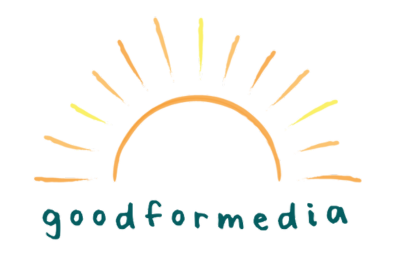
#GoodforMEdia’s Media Literacy Week Campaign
October 21-31, 2024
Introducing #GoodforMEdia’s Media Literacy Week Campaign!
With increased access to information, individuals need the skills to navigate the complex media landscape–of influencers, news, advertisements, social media, misinformation– ensuring we can make informed decisions and engage in ways that support our mental health and wellbeing.
At #GoodforMEdia we believe developing media literacy can help you have healthier and more positive experiences online.
To support this work we have youth-created tools for our peers to use and incorporate into daily practices.
Media literacy helps us:
Develop new skills to navigate media
Be aware of resources at our disposal and utilize them to be an informed consumer
Be conscious of where our news comes from
Look beyond the surface level
Gain more control over our online experiences
Set healthy boundaries with media
Become a media literacy expert! Explore each of the five skills below.
Pulled from the National Association for Media Literacy Education
-
How, when, where, and how often do you have the ability to use technology? “Access” asks us to reflect on these questions so that we can thrive in the digital world. It includes (but is not limited to):
Understanding how media, technology, and the internet works
Knowing what resources are available online
How consumers access information may determine what information they receive
Access to information and ideas without censorship; individuals should draw conclusions about media based on their own assessment, experiences, values, and beliefs
-
Analyzing media content means asking questions about its origin, purpose, and credibility. This includes (but is not limited to):
Understanding who created a piece of media/information by asking ourselves
Who is the creator? Are they knowledgeable and credible to speak on the topic? What are their biases and are they reflected here?
What do they want people to think, know, or do in response to it?
Examine the content by
Fact checking the information across multiple sources
Looking for evidence-based information
Identifying issues of representation or lack thereof
-
Evaluating involves coming up with your own conclusions about the media content you’ve already analyzed. This step comes after reflecting on your access to technology and your analysis of its purpose and context. This includes (but is not limited to):
Understanding the hidden and unhidden messages (text vs. subtext)
Considering the impact of media on self, others, groups, cultures, and society
Acknowledging how our own values, beliefs, biases, and experiences influence how we interpret media messages we encounter
-
Media creation is a form of expression. Creators must learn how to express ideas through media and communicate them effectively. Creation is a larger category that includes (but is not limited to): Writing, speaking, ideating, making art (visual, digital, audio, theatrical), posting and sharing on social media, and creating visual information or content.
Once you’ve had a chance to learn how access, analyze, and evaluate impact the way mainstream media narratives are made, take a moment to reflect on your own agenda, intent, and bias when creating an Instagram post, Snapchat story, or Tik Tok, for example.
-
Act(ion) is the end result of accessing, analyzing, and evaluating media messages. By reflecting on the way we receive information, how it's created, and how that lands on us, we are able to take action to shift to wellness-centered engagement. Action includes (but is not limited to):
Empower others by advocating for media literacy education in schools and classroom instruction
Share reliable content online
Promote positive change by supporting social justice issues
Engage civically through demonstrations, voting, canvassing, etc.
Create counter-narratives with media that add your unique voice to the media landscape
Report or fight misinformation online
Educate others about media literacy by modeling good media literacy practices online
Ask your family, friends, and peers critical questions to start conversations while engaging with media
Get involved with Media Literacy Week!
Beginning Monday, October 21 through Thursday, October 31, strengthen your media literacy skills by engaging in the following challenges. Complete 3 or more challenges for a chance to win a prize*! Be sure to submit the Participation Form for each challenge you complete. (The form will open on the day of the challenge and remain open until the next challenge, see below for details.) The first 5 people to confirm the completion of 3 challenges will win a prize!
ACCESS
Read a GoodforMEdia guide and share a key takeaway with us.
The Participation Form closed on Tue. 10/22, but we encourage you to check out our guides for helpful tips and resources!
ANALYZE
Read and analyze a GoodforMEdia “In the News” article.
1) Select and read through one of our “In the News” articles.
2) Comment your thoughts on the corresponding “In the News” post on our Instagram OR share your reflection on the form. Questions to consider: How will it impact you? Is it in the right or wrong direction?
If commenting on our “In the News” post, please submit your Instagram handle as we would love to see your feedback!
The Participation Form closed on Thur. 10/24, but we still encourage you to explore our "In the News" articles and share your insights.
EVALUATE
Reflect on and shift the default privacy and notification settings your device/platform has.
1) Identify the setting you’d like to change & why.
2) Look over these helpful guidelines to change a setting:
Teen Safety Center (Tik Tok)
Snapchat Safeguards for Teens (Snapchat)
About Instagram teen privacy and safety settings (Instagram)
Ways to help your teen use Facebook wisely (Facebook)
3) Submit a video or written response explaining why you made this change; How did it help your mental health?
4) If you will not be changing any settings or already have, feel free to share why!
The Participation Form closed on Sun. 10/27, but we encourage you to reflect on and update your settings periodically.
CREATE
Submit a testimonial (blog post, video, or multimedia response) on any of our 5 core questions below. You can also freestyle and respond to any experience you’d like to share.
What role do you think media plays in your mental health?
What advice would you give your younger self or a younger sibling getting their first phone?
What do you wish you had done differently before engaging with social media?
What strategies do you use to protect your mental health when engaging with media?
If you could advise lawmakers, parents, and/or social media platforms, what would you like to see change?
The Participation Form closed on Tue. 10/29, but we encourage you to still reflect on your relationship with the media using these core questions.
ACT
Engage in a conversation starter with a friend or family member and let us know how it went!
Visit our Conversation Cards page and select 1-2 questions to reflect on your relationship with the media. Take turns sharing.
The Participation Form closed on Thur. 10/31, but you can still engage with the Conversation Cards with your friends and family!
* Prize Guidelines
The first 5 people to submit the Participation Form with verifiable completion of the required challenges will receive a prize. To be eligible for a prize:
Read and accept the rules of participation in the Participation Form
Complete at least 3 different challenges (there is 1 challenge for each skill)
Must be located in the United States and have a valid mailing address
Eligibility:
Must be between 13 & 25 years of age
Based in the United States of America
Respond meaningfully, in English
Thoroughly complete and submit all required forms
For questions or concerns, please contact goodformedia@stanford.edu.
